There’s an art to brewing.
With top level brewing qualifications and more than four decades of experience in the industry, Belvoir Brewery has been designed and built to brew traditional English beers to the highest quality.
Housed in a purpose built building in Old Dalby, Leicestershire, the brewery has been carefully designed and lovingly created and adapted over the years to brew beer in a very traditional manner using floor malted best English barley, whole hops from Worcester and top fermenting live brewer’s yeast.
Since 1995, the brewery has evolved to become one of the larger “micros” in the Midlands today, having a 25brl brew length with a weekly output capacity of 100 barrels .
We are constantly reviewing and improving our equipment and procedures so that we maintain our high levels of quality and service.
The ingredients
Essentially you need four ingredients to make beer: water, barley, hops and yeast.
The brewer’s job is to use his experience and expertise to:
- extract the correct amount and type of sugars from the grain in the Mash Tun
- boil this liquid sugar extract (wort) with hops in the copper
- cool the hopped wort and run it into fermentation vessels where the live brewer’s yeast is added
- control the fermentation process then chill and add to casks.
To make a beer consistent the brewer needs to take into account the variation in all the natural ingredients along the way.
Water (liquor to the brewer) is very important and can play a significant part in determining the character of the beer. As with most breweries, our water is sourced locally and we keep a check on the composition to ensure consistency in our beer. As our water is not quite hard enough, we “Burtonise” it by adding more natural mineral salts that encourage and allow the reactions to take place in the Mash Tun we require - the character of the beer is determined by the different balance of salts that are added.
The main source of sugar for the fermentation comes from malted barley. We prefer a very traditional variety of English Barley (Maris Otter) that is floor malted. Along with the malted barley,we use small amounts of special malts such as Crystal and Chocolate which have been roasted longer in the maltsters’s kiln to give more colour and flavour to the beer. We also add small amounts of wheat which help give the beer more head and head retention. Naturally, other ingredients are used for more specialist beers such as oatmeal stout (Rye and Oats) and our Blue Brew (Stilton Whey).We buy most of our hops from Worcester which are choice whole hops and include traditional English varieties such as Goldings and Progress.
These days, you can source a wide variety of hops from all around the world available in small vacuum packs that allow the brewer the freedom to try different styles.
A key element to any beer is the yeast as this will play a large part in defining the character of the beer. We use a live top fermenting brewer’s yeast to ferment all our beer. The brewer’s yeast needs to be healthy, reliable and perform well in the fermenter and cask in order to achieve a beer with good flavour characteristics, correct alcoholic strength and have good sedimentation properties for clarity. As we generally crop more beer from each brew than we pitch, we always have sufficient to re-pitch into our following week’s brews. This requires exceptional hygiene standards. A brewer gets to know his yeast and he needs a good understanding of how it works by monitoring growth rate, temperature change, yeast head production, yeast head appearance, etc. Every brew is unique and care is needed to ensure the yeast performs to the best of its ability.
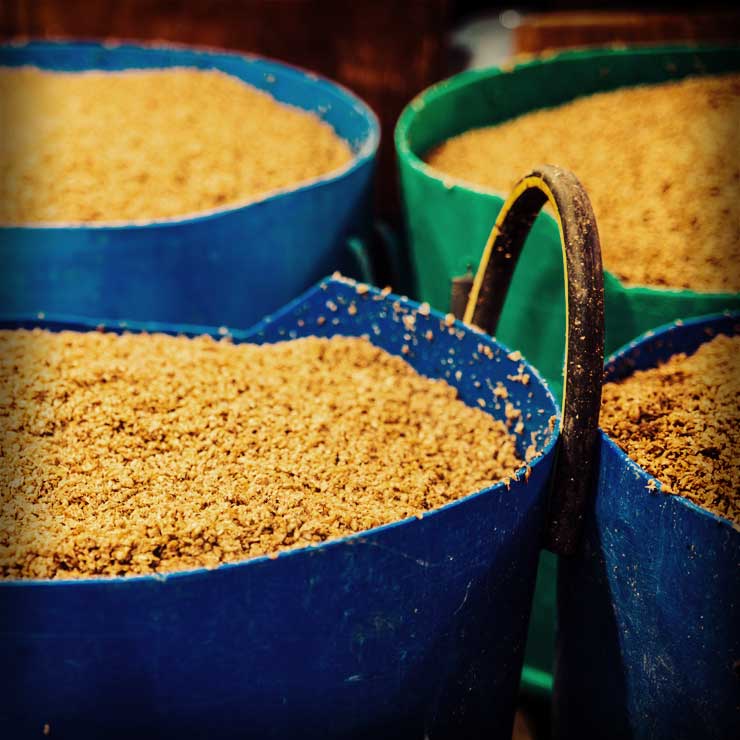
The process
The day before we brew, the dry goods are weighed out ready to add to the grist case the following morning. The dry goods mainly consist of crushed pale malt with small amounts of crushed special malts and crushed wheat. The gas fired Hot Liquor Tank is set to heat overnight to a present temperature ready for mashing in the morning.On the day itself, the temperature of the liquor is accurately adjusted and the malts added to the Grist Case. The malts are then fed though the mash mixer where they are wetted with the hot liquor. Temperature control at this point is essential to ensure the correct reactions take place in the mash tun – it is adjusted if necessary as the porridge like mix falls into the Mash Tun. Other important factors at this point to ensure an efficient mash are the ratio of liquor to malt, pH of the liquor and composition of the liquor. The mash tun at Belvoir Brewery is quite unusual as it is square and was made to order by Moeschle of Germany.
The mash is then left in the mash tun for over an hour to let nature take its course and allow the natural enzymes in the malt to break down the sugar reserves in the malt into small sugars that later the yeast can use to metabolise (ferment). The small sugars get dissolved in the liquor and after 75 minutes, they are run off into the Copper via an Underback and Valentine Arm which control the flow rate. Whilst the sweet solution (wort) is being run off, the mash is spayed (sparged) with further hot liquor to ensure all the sugar/goodness is extracted from the grains. This process takes about 2 hours depending on the size of the brew. The remaining “spent grain” goes to a local farmer for cattle feed.
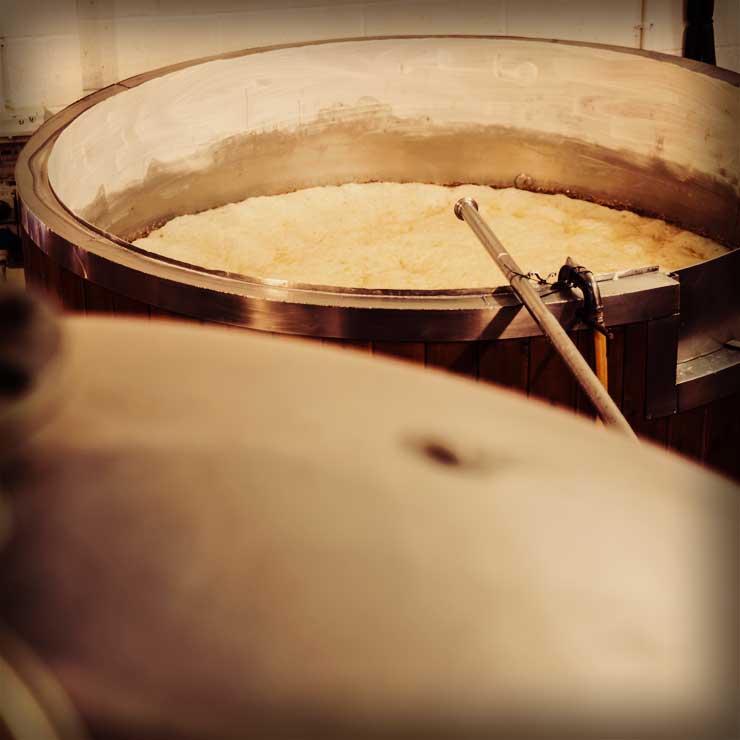
Once all the wort has been transferred into the Copper and it has been brought up to boiling point, the first hops are added. These whole hops which generally have a higher bittering value (we use Challenger or Target) give the beer its bitterness. The wort is then boiled for over an hour before more whole hops are added. These hops (second hops) are generally more aromatic and can impart a lot of character into the beer – they don’t really add to the bitterness as they are only in the boiling wort for a short period. Typical hops we use at this stage would be Goldings, Progress or Hallertau.After the second hops have been added, the boil is ended and the copper left to stand for 20 minutes to allow the contents to settle.
The hopped wort is then run off into one of our previously cleaned and sterilised Fermenters and cooled from boiling point to around 18°C by passing through a Hop Seed Filter and Heat Exchanger. The hops in the Copper form a natural filtration bed and help clear the wort as it passes out of it.
The live brewer’s Yeast (from the previous week’s brews) is added to the fermenter as the boiled chilled wort fills it up. The temperature and original gravity (measure of sugar present) are adjusted to ensure these are correct at the start of fermentation. Fermentation takes place over the next few days while temperature control and the yeast performance is closely monitored.
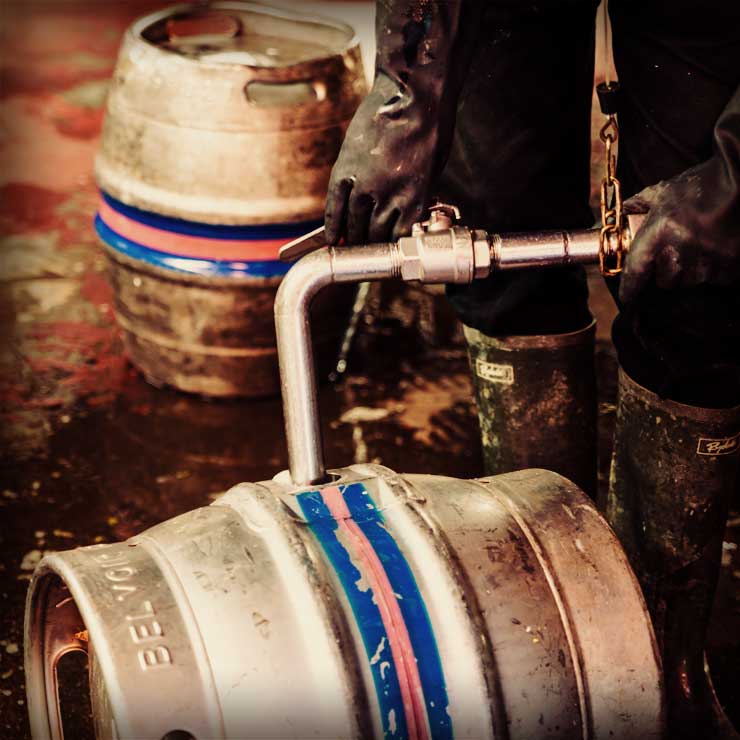
As the yeast generates heat during fermentation, we need to ensure this does not cause the fermentation to race and get too hot as this would potentially cause problems such as unwanted/undesirable flavours.As the yeast grows, a yeast head is formed which can be up to 2 feet in height. This yeast is skimmed off the beer at the end of the fermentation and stored cold in sterile containers ready for the following week’s brews.
The fermented wort (green beer) is then chilled for a period before transferring to a Racking Tank from where it is decanted into casks. A further dose of dry hops is added to the casks at this point to give the beer a final touch of character. Every cask is washed and inspected to ensure it is absolutely clean before being sterilised and filled with beer.
The full casks are then kept in cold stores at cellar temperature until being dispatched to the pubs. The beer during this time is still “alive” as it has yeast continuing to work very slowly to produce a small amount of natural gas (CO2) which gets dissolved into the beer and gives the beer some life (condition) when it comes to being dispensed.
Isinglass Finings are added to each cask to aid yeast sedimentation in the pub cellar and ensure the beers are dispensed bright and clear on the bar. We take a sample cask of each brew to check it for quality and consistency.
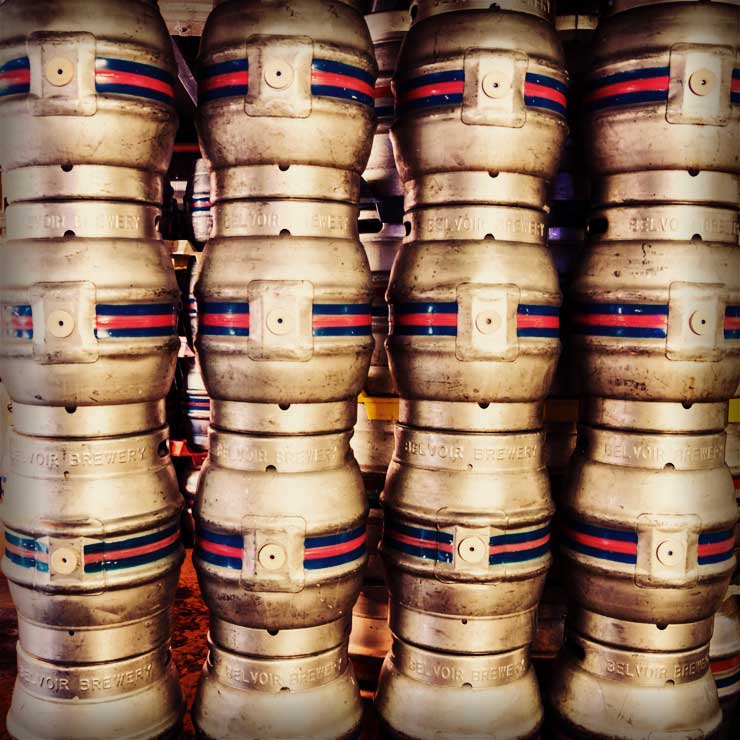
It’s a fascinating process. Why not find out what’s involved first-hand by booking a talk and taste?
Lasting around half an hour, you’ll be talked through the whole process from raw materials to finished product (including tasting session of three cask ales). To reserve your place, call us on 01664 823978. Please see our tours page for price information.
